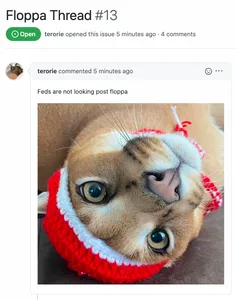Voyager CEO Stephen Ehrlich wrote on Twitter that he expected that Voyager would "emerge as a stronger company", certainly an optimistic prediction for a crypto broker that froze customer funds with no promise they will ever be able to access them, then filed for bankruptcy.
Voyager Digital files for bankruptcy
U.S. Office of Government Ethics issues guidance prohibiting executive branch employees who hold crypto from working on crypto policy
The OGE's purview is limited to the executive branch, meaning that although this impacts White House employees and federal agencies like the Federal Reserve and Treasury Department, it unfortunately does not apply to legislators.
Polium gaming console is announced, in a feat of vaporware impressive even for web3
The website advertises specifications for an eventual console that contradict — it will be both 4K and 8K, for example — and promises to integrate Apple's TouchID (despite the fact that Apple does not allow non-Apple products to use that technology). The product's Medium page describes their plans to take pre-orders before the console hardware is built (good sign), and estimates a release date of Q3 2024.
Polium has also gotten flak for its logo, which quite resembles the GameCube logo. Although they claimed in a tweet that "we did not copy the Nintendo's GameCube logo", they also promised to "illustrate a new logo that is original" — apparently acknowledging that theirs is not.
CoinLoan crypto lending platform reduces account withdrawal limit
Apparently forgetting the industry they're in, CoinLoan also wrote that their "strategy bars risky activities that could endanger CoinLoaners' funds".
- "Temporary change in withdrawal limits", CoinLoan blog
- Tweet by Bitfinex'ed
Crypto lender Vauld suspends withdrawals, considers restructuring
Vauld, which is based in Singapore, also announced that they would be bringing on financial and legal advisors to "explore and analyse all possible options, including potential restructuring options".
- "Corporate statement" by Vauld
- "Peter Thiel-Backed Crypto Lender Vauld Suspends Withdrawals", Wall Street Journal
Twitter and YouTube accounts for the British Army simultaneously hacked and used to promote NFT and crypto scams
On Twitter, the account details were changed to resemble the Possessed NFT project (as also happened to top Super Smash Bros. Ultimate player MkLeo in March). Tweets from the account announced a "new NFT collection" and linked to a fake minting website, complete with a fake counter showing the number of available NFTs appearing to dwindle.
Meanwhile, the YouTube account was rebranded to resemble ARK Invest, the investment management firm founded by Cathie Wood. It ran a steady stream of fake videos cribbed from an old, real livestream with Elon Musk and Jack Dorsey, but surrounded with borders promoting "double your money" Bitcoin and Ether scams. This is a common YouTube scam, and one such scam earned crypto scammers $1.3 million in 24 hours back in May.
Crema Finance hacked for $8.8 million, most returned
Crema Finance sent a message to the hacker via Ethereum transaction, writing that "you have 72h from now to consider becoming a white hat and keeping $800k as the bounty... Otherwise the police and legal force will officially get involved and there will be endless tracing waiting for you." On July 6, Crema announced that they had reached an agreement with the hacker, who returned most of the funds and kept 45,455 SOL ($1.68 million) as a "bounty".
Although the terms of the "bounty" agreement suggested that Crema Finance would not involve law enforcement, sometimes these things are out of platforms' hands (or they renege on the agreement). On July 11, 2023, the U.S. Attorney for the Southern District of New York announced charges against Shakeeb Ahmed, a security engineer alleged to have perpetrated the theft.
Crema Finance is not to be confused with C.R.E.A.M. Finance, a crypto lending service that was hacked three separate times in 2021 for a total of nearly $200 million.
- Tweet thread by Crema Finance
- Tweet by Crema Finance
- Tweet by Crema Finance
- "Former Security Engineer For International Technology Company Arrested For Defrauding Decentralized Cryptocurrency Exchange", U.S. Attorney's Office, Southern District of New York
Meta hammers another nail into the coffin of Libra, announcing the shutdown of their Novi project
Libra-now-Diem ground to a halt after concerns from regulatory bodies and the general public, with Facebook-now-Meta abandoning the project in January 2022. Now they've announced they'll be shutting down Calibra-now-Novi, too, and have advised users to withdraw their balance "as soon as possible". Users won't be able to add money to their accounts beginning on July 21.
- "Meta to Shutter Novi Crypto Payments Wallet in September, Ending Libra Saga", CoinDesk
- "Welcome to Novi", Meta Newsroom
Quixotic NFT marketplace hacked for more than $100,000
Quixotic is the largest NFT marketplace on Optimism, a layer 2 Ethereum network. Despite being the largest marketplace on the network, it still does fairly little in volume compared to NFT marketplaces on other networks, boasting only around $420,000 in trading volume in the last 30 days.
Quixotic paused marketplace activity after discovering the hack, and promised to reimburse all users who had tokens stolen from them.
Ankr gateways for Polygon and Fantom compromised, seed phrases possibly stolen
Polygon's chief information security officer Mudit Gupta told CoinDesk that day that "no funds [were] lost as far as we know but we are still investigating", and that dApps using the Ankr RPC endpoint were non-functional. Ankr later announced that the RPC systems had been fully restored, and that the breach had come from a "third-party vendor" that enabled attackers to change Ankr's domain hosts.
Voyager Digital suspends withdrawals and other activity
Voyager announced that they were making the decision "given current market conditions", and that it "gives us additional time to continue exploring strategic alternatives with various interested parties". They also released some financial and balance sheet updates that painted a pretty grim picture.
- "Voyager Digital Provides Market Update", press release from Voyager
Coca-Cola launches Pride NFTs, bringing the commercialization of Pride to new lows
At that price, Coca-Cola will only be earning about $21,500 (minus any expenses) if the project mints out, plus any resale fees. A many-billion-dollar company like Coca-Cola might consider just donating the 20 grand themselves.
Mirror Trading International charged after $1.7 billion fraud
Mirror Trading International was founded and operated by Cornelius Johannes Steynberg, who had been on the run from South African police until recently being detained in Brazil on an INTERPOL warrant. The CFTC is seeking full restitution, disgorgement, and bans from future trading.
On September 7, 2023, a U.S. District Court ordered MTI to pay $1.7 billion in restitution.
Owner of Circle Society platform, which advertised 600% returns, charged with fraud
The scheme ultimately drew in about $12 million from investors, beginning in late 2017. Saffron was charged with one count of conspiracy to commit wire fraud, four counts of wire fraud, one count of conspiracy to commit commodities fraud, and one count of obstruction of justice. If convicted of all charges, he faces up to 115 years in prison.
Previously, in April 2021, the a court ordered Circle Society and Saffron to pay $32 million in relation to the scheme after a default judgment in a lawsuit from the CFTC, who described the whole thing as a Ponzi scheme.
- "Justice Department Announces Enforcement Action Charging Six Individuals with Cryptocurrency Fraud Offenses in Cases Involving Over $100 Million in Intended Losses", U.S. Department of Justice
- "Federal Court Orders Nevada Company and its Owner to Pay More Than $32 Million for Cryptocurrency Fraud and Misappropriation Scheme", CFTC
Operator of fraudulent Titanium Blockchain Infrastructure Services ICO charged with securities fraud
The DoJ alleges that Stollery falsified the TBIS whitepaper, wrote fake testimonials on the project website, and made up business relationships with the U.S. Federal Reserve Board and large companies including Apple, Pfizer, and Disney.
If convicted on all counts, Stollery faces up to 20 years in prison.
U.S. Department of Justice charges founders of the $100 million EmpiresX ponzi scheme
All three are facing charges of conspiracy to commit wire fraud and conspiracy to commit securities fraud, and Pires and Goncalves have also been charged with conspiracy to commit international money laundering. If convicted on all counts, Pires and Goncalves face up to 45 years in prison and Nicholas faces up to 25 years in prison.
U.S. Department of Justice charges one person behind the "Baller Apes" rug pull
The people behind the Baller Ape NFT project were also reportedly behind at least two other NFT rug pulls, including "Big Daddy Ape Club". These projects were not mentioned in the DoJ press release.
FTX reportedly approaches a deal to buy BlockFi in "fire sale"
BlockFi was last valued at $4.8 billion, but FTX is expected to pay around $25 million to buy the company. BlockFi CEO Zac Prince refuted what he described as a "market rumor": "I can 100% confirm that we aren't being sold for $25M." A leaked call with Morgan Creek Digital investors suggested they were trying to counter FTX's offer, and that BlockFi was being valued at less than $500 million. The call also revealed that BlockFi's loan to Three Arrows Capital had been $1 billion, and that it was backed by collateral of $1.33 billion in Bitcoin and GBTC.
CNBC reported that, according to one of their sources, "equity investors in BlockFi are 'wiped out' and are now writing off the value of their losses."
FOIA request reveals that Coinbase has been providing ICE with blockchain analytics tools
Cryptocurrency has long been touted as a tool for the unbanked, including those who don't have access to banking because they're undocumented, and for people hoping to operate free from government observation. Coinbase, however, has actively courted government contracts such as this one, which has not won them favor among the more libertarian-leaning crypto enthusiasts.
SEC rejects Grayscale application to create Bitcoin ETF
Also on the 29th, the SEC rejected an application from Bitwise to create a Bitcoin exchange-traded product (ETP).
Grayscale immediately announced they would be suing the SEC, a course of action they'd been suggesting for several months. Don't hold your breath, though — a litigation analyst estimated such a lawsuit would take 12–18 months to reach resolution.
Crypto games site "w3itch.io" blatantly copies itch.io, hosts stolen games
W3itch.io apparently decided the best way to accomplish their goal would be to not only steal itch.io's site design, but the source code itself. The games hosted on the website were also taken without the consent from their creators.
After being called out by the KennyNL Twitter account, W3itch.io admitted to stealing the CSS, as well as buying Twitter followers. However, they refused to take the website down, and seemed to claim they were unable to remove listings of stolen games.
Three Arrows Capital ordered to liquidate
The court action followed lawsuits from several creditors over its failure to pay debts. Those creditors included Voyager Digital, who reduced their platform's withdrawal limit after reporting their exposure to 3AC, as well as the crypto exchange Deribit.
- "Crypto Hedge Fund Three Arrows Ordered by Court to Liquidate", Wall Street Journal
CEO and CFO resign from Compass Mining
Hacker makes off with $3.8 million from the XCarnival "metaverse bank", returns half
A hacker was able to exploit a flaw in the smart contract for the project, stealing crypto notionally worth $3.8 million. The loss to the protocol was likely higher. XCarnival paused its smart contract after learning about the hack from a crypto watchdog.
On June 26, XCarnival announced that they had reached an agreement to give a 1,500 ETH "bug bounty" to the attacker, who agreed to return the remaining 1,587 ETH ($1.9 million) with an agreement that XCarnival would not pursue legal action.
Even a free sports car couldn't get anyone to bid on Chevrolet's first NFT
The NFT went up for sale on June 20, with bidding scheduled to last for four days, and a starting bid of 206 ETH (around $240,000). Apparently collectors decided the NFT wasn't enough to justify dropping that kind of cash on a car that is expected to sell for around $90,000, because the auction received no bids.
SuperRare, the marketplace used for the auction, explained that users must have missed the opportunity to bid "due to the craziness of NFT NYC" (a cryptocurrency conference that ran from June 20–23), and the project extended the bidding time by 24 hours. After the 24 hours had elapsed, they still had zero bids.
Crypto payments not so popular at the crypto-themed restaurant
The Times later updated the story, writing that the company's co-founder told them that the restaurant shuts off the payment system "'from time to time' for upgrades", but was still accepting crypto.
The menu lists prices in USD, not Ether or Apecoin, and most people buy their $13 hamburgers with plain old fiat.
- Inside the crypto restaurant after the crypto crash, Los Angeles Times
Cryptocurrency exchange Bitpanda announces layoffs, rescindment of offers
The company announced they would be "scal[ing] down to a target organisational size of about 730 people". The company seems to have had around 1,000 employees, which means they are laying off around a quarter of their workforce. They also announced they would be rescinding employment offers they had extended recently.
- "The Way Forward", BitPanda
Cryptocurrencies notionally worth $100 million stolen from Horizon Bridge
On June 23, someone was able to steal assets from the bridge that they then converted to more than 85,800 ETH. The stolen funds are notionally valued at almost $100 million, assuming the thief can cash them out successfully. Hours after the attack, most of the funds remained in the thief's wallet and had not yet been laundered.
A June 29 analysis by blockchain research firm Ellipsis claimed that "there are strong indications that North Korea's Lazarus Group may be responsible for this theft". Lazarus was also behind the $625 million bridge hack in March, targeting the Axie Infinity game.
Senators Lummis and Gillibrand solicit feedback on their proposed crypto legislation via Github and it's off to a predictably chaotic start
As one might expect, apparently-unmoderated open comments from some of the most online people out there has been off to a chaotic start. The first comment on the proposal, by a user with a Pepe the Frog avatar, is titled "Taxation is theft!" and reads, "Why should we pay any taxes to a corrupt government that prints money out of thin air and gives it away for free! Eliminate the FED!!! BITCOIN FOREVER!"
Another comment thread begins, "Feds are not looking post floppa" and accumulated over 100 replies containing photos of caracals within half an hour.
A different person submitted a pull request replacing the entire text of the bill with "cryptocurrencies are banned lmao".
On July 13, the creators of the Github repository removed all the issues and archived the repository, apparently bringing the experiment to its end.
- RFIA bill Github project
- Tweet by Cynthia Lummis
- Tweet thread by Molly White
CoinFLEX stops withdrawals due to "continued uncertainty involving a counterparty"
The company then posted an announcement that they would be "pausing all withdrawals" due to "extreme market conditions last week & continued uncertainty involving a counterparty". They were cagey about the identity of the counterparty, though the announcement explicitly stated it was not the underwater hedge fund Three Arrows Capital, which has been causing a domino effect throughout the crypto industry. They later alleged the counterparty was Roger Ver, though he denied the claim.
CoinFLEX began allowing customers to withdraw up to 10% of their funds on July 14, but the remaining 90% continued to be inaccessible to them.
- "Update on withdrawals", CoinFLEX
Hostess announces $TWINKcoin snack cakes
- "Hostess launches $TWINKcoin snack cakes", Food Business News
Invictus Capital suspends withdrawals
Ontario Securities Commission settles with Bybit, bans and fines KuCoin for securities violations
Bybit opted to settle with the OSC, disgorging about CA$2.5 million (US$1.9 million) and has begun working with the OSC to become compliant.
OSC accused KuCoin of not complying with the investigation, and permanently banned the exchange from operating in Ontario. The OSC also levied a CA$2 million (US$1.5 million) fine against the exchange.
- "Ontario Securities Commission Slaps Bybit and KuCoin With Penalties", CoinDesk
- "OSC holds global crypto asset trading platforms accountable", Ontario Securities Commission
Voyager Digital reduces withdrawal limit after reporting $660 million exposure to Three Arrows Capital
Later that day, Voyager reduced the daily withdrawal limit from $25,000 to $10,000, suggesting they were having trouble meeting customer demand for withdrawals.
The prior week, Voyager announced they had secured a line of credit from Alameda Research amounting to $200 million in cash and 15,000 Bitcoin. Alameda Research is a trading firm founded by Sam Bankman-Fried, who also runs the FTX crypto exchange.
Vauld lays off 30% of workforce and slashes executive pay
Almost a year earlier, in June 2021, Vauld raised $25 million in a Series A round led by Peter Thiel's Valar Ventures, which was also joined by Coinbase and Pantera Capital.
Sam Bankman-Fried performs second bailout, loaning $250 million to BlockFi
The FTX loan represents the second bailout of a crypto firm by Sam Bankman-Fried's companies, after his Alameda Research trading firm extended credit equivalent to around $485 million to floundering crypto platform Voyager.
- "Crypto exchange FTX bails out lending platform BlockFi", Financial Times
Bybit plans to cut 20–30% of its workforce
Two QAnon influencers running crypto scams steal more than $2 million from their followers
According to Logically, the "vast majority" of people following the influencers' investment advice "lost anywhere between several hundred and tens of thousands of dollars". One man lost more than $100,000, resulting in him also losing his house and construction business. The man ultimately died by suicide.
South Korea bans current and former Terraform Labs employees from leaving the country
He later clarified that he was willing to cooperate with the investigation against TFL, but was dismayed that employees who left long before the collapse were facing an exit ban, and that they weren't notified of the ban.
Terra is facing a class action lawsuit from Korean investors, and local news had previously reported that South Korean authorities had launched an investigation.
Lacoste Discord among the latest to be hacked
Since the last post about an NFT project having its Discord compromised, five days ago, we've seen at least fifteen more projects suffer the same: Clyde, Good Skellas, Duppies, Oak Paradise, Tasties, Yuko Clan, Mono Apes, ApeX Club, Anata, GREED, CITADEL, DegenIslands, Sphynx Underground Society, FUD Bois, and Uncanny Club.
Hoo exchange pauses withdrawals
- "Announcement of Withdrawl on Hoo", Hoo blog
Defi insurer Bancor pauses their impermanent loss protection due to "hostile market conditions"
Bancor wrote in their announcement that "Withdrawals performed during this unstable period will not be eligible for IL protection. Users who remain in the protocol will continue earning yields and be entitled to withdraw their fully-protected value when IL protection is reactivated." Many view this as Bancor holding their crypto hostage, because they would take a major loss if they withdrew while IL protection was paused.
The post goes on to say that "two large centralized entities" (likely Celsius and Three Arrows Capital) have rapidly liquidated their $BNT positions and withdrawn a large amount of liquidity; Bancor also wrote that another entity has opened a large short against $BNT.
- "Market Conditions Update — June 19, 2022", Bancor blog
Solend DAO passes proposal to take over the account of a large holder with a position that poses systemic risk
The proposal allows Solend to temporarily take over the whale's account to liquidate the position "gracefully", rather than allowing the liquidation to happen as it normally would. This stems from the concern that the partial liquidation (20%, or around $21 million) would "cause chaos" on both Solend and the Solana blockchain more broadly. The proposal outlined concerns around Solend potentially ending up with bad debt, and liquidators "spamming the liquidate function" and potentially taking down the Solana chain.
The proposal elicited strongly negative reactions from many in the crypto community, who feel that a project taking over a user's account flies in the face of the concept of defi and sets a dangerous precedent. Others blame Solend for allowing the position in the first place, given the level of systemic risk. Some have also pointed out that Solend may be exposing themselves to legal risk by retroactively changing the terms of the loan.
The proposal succeeded hours after it was proposed, with one whale providing 1 million votes out of the 1.15 million votes in favor.
- "SLND1: Mitigate Risk From Whale" proposal
Magic Internet Money stablecoin wobbles
On June 17, $MIM began to lose its $1 peg, and on June 18 it dropped below $0.91. Later on June 18, it returned above $0.95, but continued to be priced below its intended peg.
The supply of $MIM dropped precipitously in the wake of the Terra collapse, as traders lost confidence in algorithmic stablecoins more broadly. Amidst plummeting markets, rumors have surfaced that Abracadabra is "nearly insolvent" due to bad debt left over from the Terra crash. Sesta has refuted the claim, writing on Twitter that the "treasury has more money than the debt" and that the rumors were simply people "spread[ing] FUD [to] try to recover your losses from shorting a bit". The project announced that it would be implementing "peg stability measures", including increasing interest rates on one of their lending markets.
MakerDAO halts Aave–DAI direct deposit due to concerns over risk
The same MakerDAO team member wrote in the forum that "Contagion risks in DeFi are increasing", and that the project wanted to "cut exposure" to projects that were in trouble. "We could be dealing with Lehman's moment in crypto," he wrote.
Three Arrows Capital looks for a bailout
According to the WSJ, 3AC has hired legal and financial advisors to pursue solutions including asset selloffs or rescue by another firm, and is trying to extend the deadlines for outstanding debt repayments.
- "Crypto Hedge Fund Three Arrows Capital Considers Asset Sales, Bailout", Wall Street Journal
Babel Finance suspends withdrawals and redemptions
Some in the crypto space have been encouraging people to withdraw their funds from any type of staking or lending platform, as liquidations and failures to repay debt spreads through the tightly-interconnected ecosystem. On June 16, yield farming platform Finblox implemented a very low cap on the amount of funds customers could withdraw, citing exposure to the apparently insolvent Three Arrows Capital.
- "Babel Finance Suspends Withdrawals, Citing 'Unusual Liquidity Pressures'", CoinDesk
- Notice from Babel Finance
AEX crypto exchange limits withdrawals after a $1 billion "bank run"
The exchange then announced they would be delaying the withdrawals of most popular cryptocurrencies for 36 hours "to avoid unnecessary panic withdrawal". A follow-up blog post the next day announced they would be allowing users to withdraw, but only up to $500 a day. They later adjusted the withdrawal limits to a more flexible model, but left them in place.
As an apology to their customers, AEX promised "AEX Shareholder Badges" to the people with the most funds in their platform. They also announced a Texas Hold'em Carnival to show their "appreciation" of their users, but they canceled it the same day. Perhaps focusing on the liquidity issue is the right choice...
Anna "Delvey" Sorokin announces she will "move away from the 'scammer persona'" and launch NFTs
Finblox implements withdrawal limits and pauses rewards due to exposure to Three Arrows Capital
Finblox announced that all users would only be able to withdraw up to $500 a day, up to a monthly maximum of $1,500 — quite a change from the $50,000/day withdrawal limit for some of their users. They also wrote that they would be pausing reward distributions, and delaying their referral program and deposit rewards, and preventing newly registered users from creating new crypto addresses.
Finblox ended the message to their users by saying they would "do everything in its power to protect our users' funds and reinstate our services in full", but such a dramatic move seems to suggest the platform is another domino to fall as companies collapse throughout the crypto ecosystem.









































